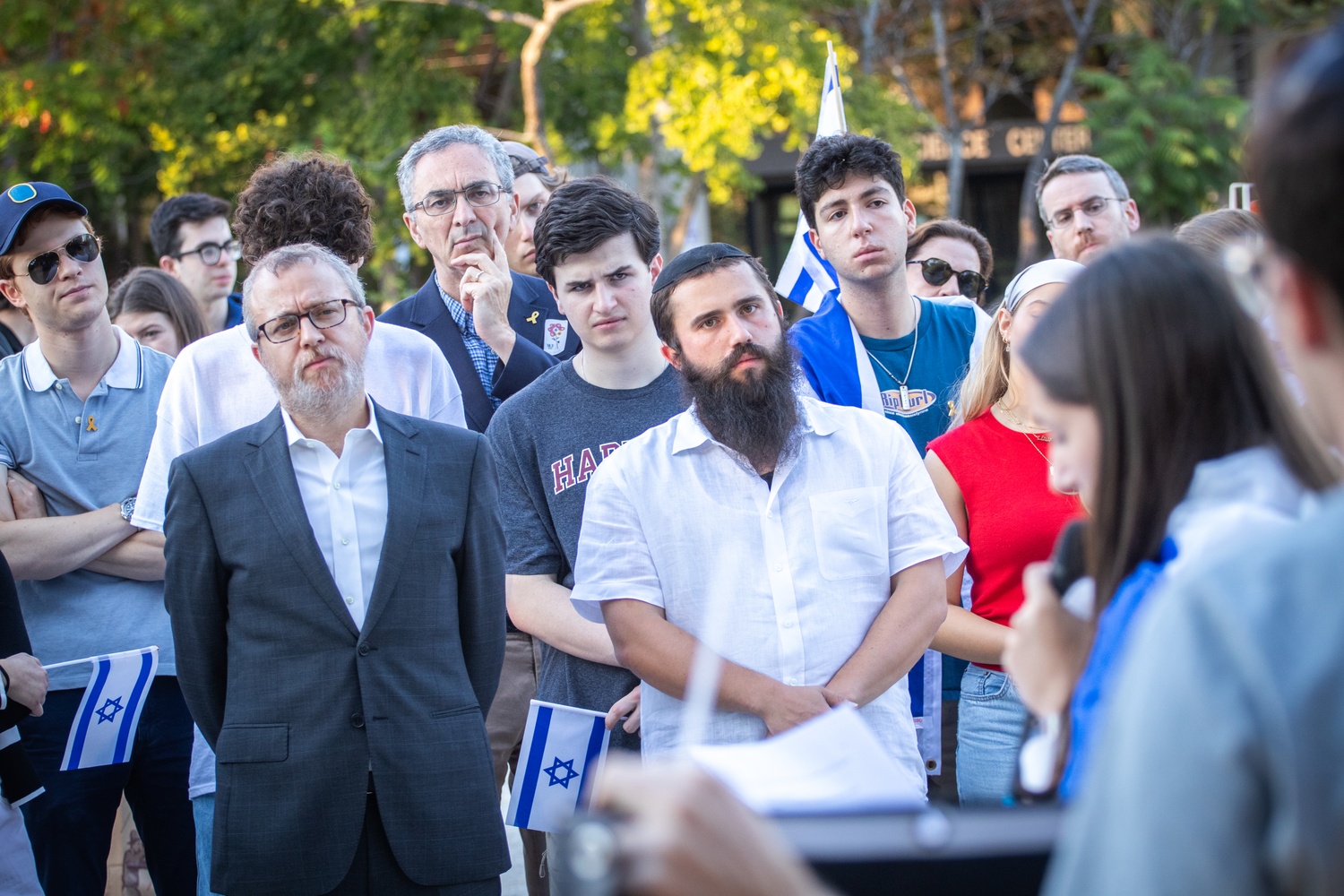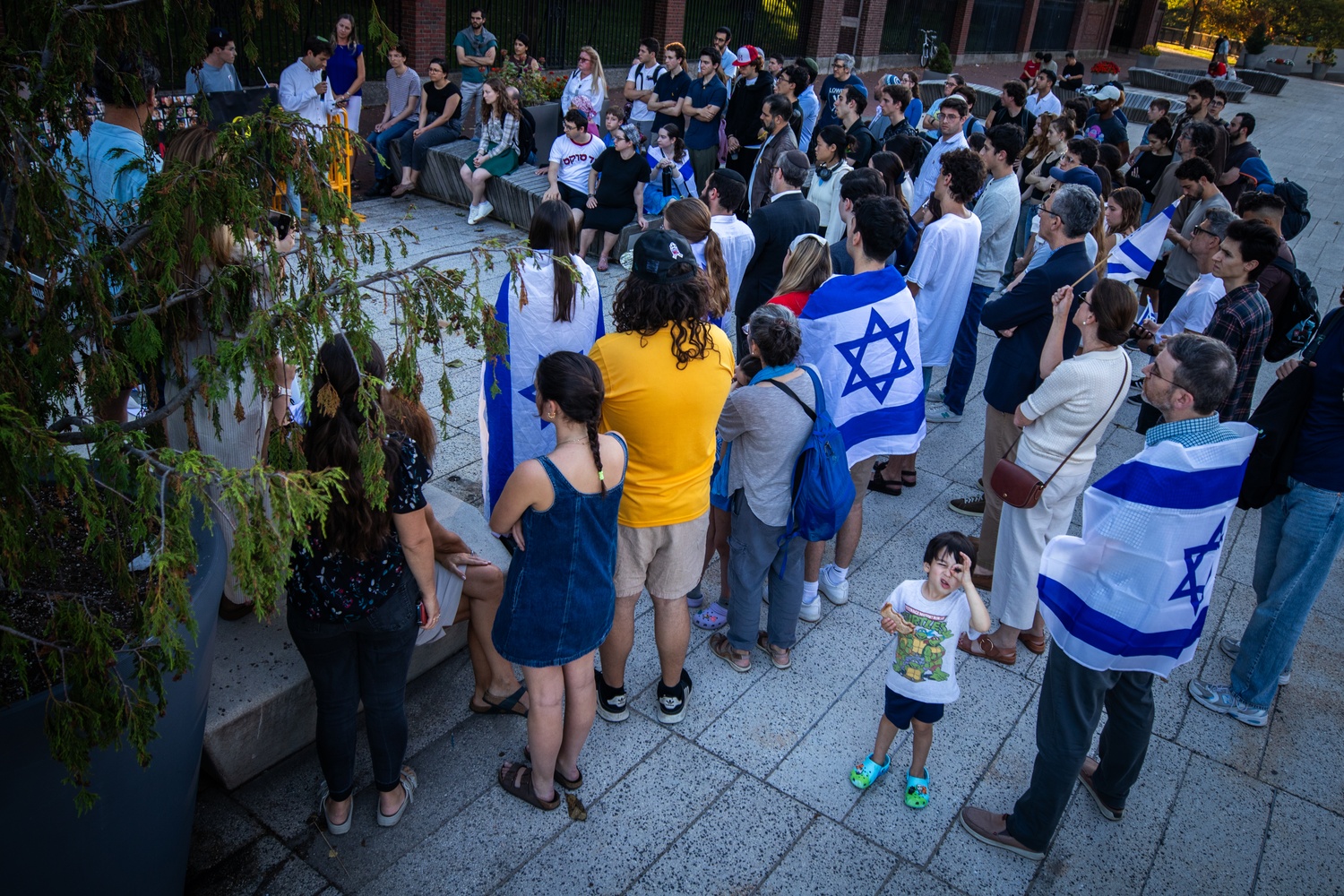
News
Summers Will Not Finish Semester of Teaching as Harvard Investigates Epstein Ties

News
Harvard College Students Report Favoring Divestment from Israel in HUA Survey

News
‘He Should Resign’: Harvard Undergrads Take Hard Line Against Summers Over Epstein Scandal

News
Harvard To Launch New Investigation Into Epstein’s Ties to Summers, Other University Affiliates

News
Harvard Students To Vote on Divestment From Israel in Inaugural HUA Election Survey
Two Years After Oct. 7 Attacks, Harvard Jewish Groups Hold Vigil to Remember Victims

More than 100 people gathered in the Science Center Plaza Sunday evening for a vigil to mourn those killed in Hamas’ Oct. 7 attack on Israel nearly two years ago.
The event, organized by Harvard Chabad and Harvard Hillel, marks the second anniversary of the attacks. Attendees recited prayers for the more than 1,000 people killed in the attacks and Israeli hostages taken by Hamas. They held up Israeli flags and donned yellow ribbon pins, a symbol of solidarity with people still held hostage.
Harvard’s campus became the center of its own international scandal after the attack, when the combination of a controversial student statement that blamed Israel, and a muted institutional response from former Harvard President Claudine Gay sparked unprecedented outrage. Many of the Trump administration’s current initiatives to punish Harvard for its response to antisemitism and pro-Palestine protests originate in the weeks following Oct. 7.
Harvard Chabad Rabbi Hirschy Zarchi said it was important for the vigil to be held in the plaza, just outside Harvard Yard, to spread awareness of the people still in captivity.
“Harvard is your home, and we unite and come together publicly, even in pain, but filled with hope and with horror, with these contradictory feelings. We don’t have to do so hidden or sheltered in Hillel or Chabad,” he said.
The vigil was held on Oct. 5, two days before the anniversary of the attack, to not conflict with celebrations of the Jewish holiday Sukkot.
In his speech, Zarchi condemned an attack that killed two people at a synagogue in England on Thursday during services for Yom Kippur.
He reassured attendees that while there were incidents of antisemitism worldwide, the Harvard Law School visiting professor who was arrested for shooting a pellet gun last week near a Brookline synagogue was not motivated by antisemitism. (The visiting professor, Carlos Portugal Gouvea, told police he was hunting rats.)
“This man is married to a Jewish woman and has Jewish children, and it’s absolutely nothing to do with targeting the Jewish community,” he said.
“If it adds a measure of comfort and reassurance to our community, I thought it’s appropriate to just share that, so we can all take a sigh of relief,” he added.
Harvard Kennedy School student Tzur Goldin, whose brother was killed by Hamas in 2014, told the crowd that he has felt a new sense of national unity to “fight for one another” after the attacks.
“Our hope, our past, and our future begin with the strength to stand for one another — to take two separate triangles and unite them,” he said, referencing the Israeli flag.

Tamar H. Scheinfeld ’29 said she wanted to focus on remembering the lives of those killed, including a mentor of hers from high school, instead of dwelling on the attack itself.
“I think about that a lot — how someone who so embodied life could be taken in such senseless violence,” she said. “But I also think about how she lived, how she taught me to smile bigger, to love harder, to care about Israel.”
Since Oct. 7, 2023, Israel has launched a series of military offensives in Gaza, killing more than 60,000 Palestinians, according to Gaza’s Health Ministry, run by Hamas, which has controlled Gaza since 2007. Israeli officials have blocked the flow of aid into Gaza, issued sweeping mass displacement orders, and intensified aerial attacks on overcrowded neighborhoods.
Hamas agreed to release all Israeli hostages last week as part of President Donald Trump’s peace plan, but the agreement has not been finalized. A new round of negotiations between Israel and Hamas are set to begin on Monday.
Rabbi Jason B. Rubenstein ’04, the executive director of Hillel, and Rabbi Getzel Davis, the newly appointed director of interfaith engagement at Harvard, were both present at the vigil, though they did not speak.
But in an interview following the vigil, Rubenstein said that there was a sentiment of “faint hope” among attendees following Hamas’ agreement to release all remaining Israeli hostages.
“We’re all cautiously hopeful about what the current conversations around a cease fire and return of the hostages around an end to the war and death and bloodshed might mean,” he said. “We’re certainly very fervently praying for it.”
—Staff writer Sebastian B. Connolly can be reached at sebastian.connolly@thecrimson.com. Follow him on X @SebastianC4784.
—Staff writer Grace E. Yoon can be reached at grace.yoon@thecrimson.com. Follow her on X @graceunkyoon.
Want to keep up with breaking news? Subscribe to our email newsletter.
